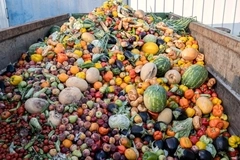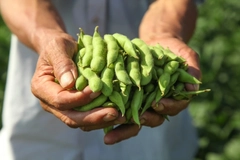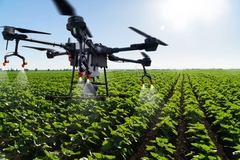Fungi aids sustainable agriculture in US-based plant science collaboration
 Armando Bravo, who led the project and lab members in a greenhouse (Image credit: Donald Danforth Plant Science Center).
Armando Bravo, who led the project and lab members in a greenhouse (Image credit: Donald Danforth Plant Science Center).US-based Donald Danforth Plant Science Center has collaborated with Enhanced Nature (EN) and Symbiotic Sciences to accelerate and optimize the in-vitro growth of arbuscular mycorrhizal fungi (AMF). The fungi form a symbiotic relationship with plant roots and are a key organic component contributing to more sustainable and profitable agriculture practices.
Symbiotic Sciences is EN’s parent company and an innovator in AMF research and large-scale production. EN supplies high quality AMF-based bionutrients to bionutrient suppliers, retailers and wholesalers.
The collaboration allows EN to increase its supply of AMF “without sacrificing quality or adding equipment,” Rob Gibson, VP of business development and sales at EN, tells Food Ingredients First.
“Traditionally, AMF have been cornered to the high-value specialty markets due to scalability. Our ability to scale now creates a place for AMF beyond high-value, small acres to other specialty markets plus row crops like corn and soy.”
He adds that the quality and consistency of EN’s strains (of AMF) also allow growers to reach their expected ROI in all markets.
Tackling environmental stress
About 70% of all plants naturally form symbiotic relationships with AMF, says EN. The fungi live underground in close association with plant roots and support the absorption of nutrients like phosphorus and nitrogen from the soil.
 AMF assist in climate change impact by sequestering carbon in the soil, says Rob Gibson, EN’s VP of business development and sales.“AMF deliver a consistent supply of critical nutrients to the plant throughout the season promoting yield, vigor and overall plant health. AMF assists in climate change impact by sequestering carbon in the soil,” explains Gibson.
AMF assist in climate change impact by sequestering carbon in the soil, says Rob Gibson, EN’s VP of business development and sales.“AMF deliver a consistent supply of critical nutrients to the plant throughout the season promoting yield, vigor and overall plant health. AMF assists in climate change impact by sequestering carbon in the soil,” explains Gibson.
They also allow the plant to access more water, micro and macronutrients under current farming practices.
“AMF are natural to the soil, but farming practices through the years have disrupted their ability to sequester carbon. So the presence of high-quality strains makes it possible for AMF to have a relationship with the plant and exchange nutrients for carbon,” he adds.
AMFs benefit most crops, except brassicas and provide greater yields “even under highly stressful conditions.” These include such as drought and depleted soils, whose severity and likelihood is rising due to extreme weather events, according to the Intergovernmental Panel on Climate Change.
Overcoming barriers to adoption
AMF sales worldwide are projected to grow at 10-15% annually (CAGR) over the next eight years, notes EN.
However, while AMF’s benefits to plants have been known for decades, its widespread agricultural adoption has remained limited due to inefficient production methods, flags Armando Bravo, assistant member at the Danforth Center, who is leading the project.
“Recent breakthroughs in AM symbiosis research could enhance our ability to cultivate AMF more effectively. These advances not only deepen our understanding of AMF’s functions but also offer practical applications for improved fungal production.”
 The quality and consistency of EN’s AMF strains allow growers to reach their expected ROI in all markets.Bravo believes the center’s collaboration with EN will benefit both Symbiotic Sciences and the Danforth Center by advancing basic science and sustainable agricultural practices, “just like the symbiotic relationship between AMF and plants.”
The quality and consistency of EN’s AMF strains allow growers to reach their expected ROI in all markets.Bravo believes the center’s collaboration with EN will benefit both Symbiotic Sciences and the Danforth Center by advancing basic science and sustainable agricultural practices, “just like the symbiotic relationship between AMF and plants.”
Shouvik Chowdhury, VP of product development and strategy at EN, agrees that the move will open up “innovative pathways” to enhance AMF's production efficiency and scalability.
He also observes that the variety of AMF products sold by EN has triggered a rapid increase in demand.
“Supply of high quality AMF is limited, so methods to increase production efficiencies without compromising quality are clearly needed.”
F&B impact
AMF is fairly distant in the supply chain from F&B markets as it goes in with the fertilizer and seed, significantly upstream, says Gibson.
However, the product is accepted under Organic Material Review Institute (OMRI) and other organic certifications which many F&B suppliers require.
OMRI is a nonprofit organization that independently reviews products, such as fertilizers, pest controls, livestock health care products and numerous other inputs that are intended for use in certified organic production and processing.

















